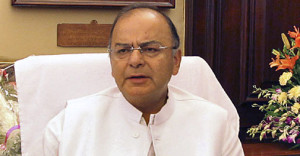Top Stories
Stay Positives


Budget 2018-19 makes misses on many fronts, still manages to offer a few goodies to real estate sector
Like every year, the Union Budget presentation was a keenly-watched exercise by the real estate industry this year as well. At the end of the day, it didn’t turn out to be exiting, nor was it too disappointing either. Though many of the industry’s demands were overlooked, announcements like a dedicated fund for affordable housing, hiking of smart city allocation and a little tinkering in circle rates for taxation purposes turned out to be positive takeaways. While ruing over crucial misses, the industry was left counting the stray positives which Finance Minister Arun Jaitley had to offer in his fifth attempt.
Team R&M
The last full Budget of the present Government, presented by Finance Minister Arun Jaitley to Parliament on February 1, failed to offer anything substantial to the real estate sector. Still in the process of settling into RERA environment while concurrently adapting to the GST regime, the industry was hoping for some kind of a cushion from the Government, which it has been denied. That is, perhaps, why the Union Budget 2018-19, with its strong focus on rural, agriculture and deprived sections, has failed to get an unqualified thumbs up from the industry.
With most of its demands like grant of industry status, single-window clearance and GST rationalisation having been overlooked, the real estate industry’s response to Jaitley’s fifth such exercise has been largely tepid. Without being overly critical of the absence of any specific announcements for it, the industry was cautious enough in dubbing it as “balanced but not a boon for real estate.”
Before elaborating on hordes of misses, it will be appropriate to dwell on stray positives that the real estate industry has received from the Budget. The first among these is the FM’s announcement of a dedicated fund for affordable housing. Jaitley said, “My Government will establish a dedicated Affordable Housing Fund (AHF) in National Housing Bank, funded from priority sector lending shortfall and fully serviced bonds authorised by the Government of India.” The announcement was hailed all across the industry.


Union Finance Minister
“My Government will establish a dedicated Affordable Housing Fund (AHF) in National Housing Bank, funded from priority sector lending shortfall and fully serviced bonds authorised by the Government of India.”
The other development which brought some cheer is the attempt in the Budget to address the taxation problems that emerge from the gap that arises when property is sold at prices lower than the Government-fixed circle rates. The Budget 2018-19 has proposed tax relief for buyers and sellers by allowing property to be valued at up to 5 per cent below circle rates for calculation of stamp duty and capital gains tax. To minimise hardships in genuine transactions, the Finance Minister has proposed that no adjustment shall be made when the circle rate value does not exceed 5 per cent of the consideration.
Though welcomed at large, developers say this is not enough and that stamp duty should be levied on real transaction value and not on the circle rate value. Ramesh Nair, CEO and Country Head, JLL India, said the proposal would reduce difficulties for sellers. “With this, the Government has recognised that there could be price variations within a zone or locality that has the same circle rate”, he said.
The Smart Cities Mission, the Prime Minister’s most ambitious urban renewal programme, has received a 54 per cent jump in the Budget for 2018-19 over the previous year. The programme to develop 100 smart cities has been allocated Rs 6,169 crore in 2018-19. “Urbanisation is our opportunity and priority,” said Jaitley, adding, “I am happy to inform that 99 cities have been selected with an outlay of Rs 2.04 lakh crore. These cities have started implementing various projects like smart command and control centre, smart roads, solar rooftops, intelligent transport systems and smart parks”.
However, the Government’s other urban development scheme — Atal Mission for Rejuvenation and Urban Transformation (AMRUT) – which aims to develop 500 cities will feel the pinch with its allocation cut to Rs 6000 crore in 2018-19 from Rs 9000 crore in 2017-18.
The Finance Minister’s announcement of regional air connectivity scheme to connect 56 un-served airports is also a laudable step for the sector with Anuj Puri, Chairman of ANAROCK Property Consultants, calling it “good news for business growth and office space demand in smaller cities, with a natural spinoff demand for housing on the back of job generation.”


President Naredco
“It is possible that steps for promotion of rental housing and for removal of distortions in some provisions of the Income Tax Act can be taken during the discussions on the Budget”.
While the list of positive takeaways for the realty sector ends here, there are endless instances of missed opportunity in Jaitley’s Budget for the next fiscal. The FM failed to incentivise home-buying by not offering any sops to individual taxpayers by keeping the income tax slabs constant. A change in the standard tax deduction in lieu of transport and medical expenses was the only gift to the salaried class. There was also no change in tax savings on home loans, nor were the 80C limits raised.


Credai National
“The Government’s seriousness and target to achieve ‘Housing for All by 2022’ saw a boost for the affordable housing segment where an affordable housing fund has been proposed.”
Developers’ hopes of seeing greater clarity pertaining to GST regime have also been put paid to by the Budget 2018-19. With multiple taxes, such as GST, stamp duty and registration, being levied on property transactions, buyers have become hesitant to invest in real estate, they argued. They were, hence, looking for rationalisation of taxes which has not happened in this Budget.


President, Credai Western UP
“For a sentiment-driven sector such as real estate, it is imperative that the Budget proposes benefits towards the personal income tax model.”


Director, Mahagun Group
“Since this was the first Budget after the nationwide implementation of GST and RERA, we were expecting some gaps to be filled. Apart from affordable housing segment and infrastructure development, nothing much has been presented for the realty sector.”


“The establishment of a dedicated affordable housing fund under NHB for priority sector lending will provide a further impetus to the development of housing in this segment,”
The industry was also of the opinion that the current GST rate of 18 per cent coupled with one-third abatement for land is adding huge upwards pressure on the overall cost of house. It had recommend lowering of the GST rates for affordable housing projects to 12 per cent with 50 per cent abatement for land taking the effective GST rate to 6 per cent. This step, they felt, could have provided a boost to Government’s pet project of ‘Housing for All by 2022’. Their hopes, however, have remained illusory post-Budget.


CMD, Knight Frank
“The sector grappling with the reforms-driven new order has been bereft of any meaningful interventions that could have been achieved through the budget”.
Another failing of the Budget has been on the REITs front. Despite the regulatory approval being in place for quite some time, REITs have been held back till date. There was a pre-Budget suggestion that the long term capital gains holding period for REIT units should be brought down from three years to one year. That could have made REITs more attractive for the investors but this wish has also remained unfulfilled.
Besides these, the two long pending demands regarding industry status to real estate sector and single-window clearance have gone unheeded. Extending industry status to the entire real estate sector could have helped developers raise funds at lower rates thereby reducing their project costs. The clearance and approval process for residential projects has been an impediment for a long time and a single-window clearance was essential to help improve the environment. Mr Jaitley’s Budget is silent on both these issues.
However, despite a major portion of its wish-list getting virtually overlooked in the Budget 2018, the real estate industry has not gone hammer and tongs against the Finance Minister. Without being bullish, the sector is rather happy counting the takeaways that have come in its kitty. The overall thrust of the Budget has also blunted the sharp criticism which the Budget could have evoked from the sector which has been denied many of its demands. The feedback received from domain experts, analysts, developers and channel partners clearly points towards the maturity and coming of age of the real estate industry.
Calling it a “realistic Budget”, Niranjan Hiranandani, President of Naredco, said the announcements made in regard to agriculture, infrastructure, education and the National Health Protection Scheme are all measures “which will give a huge boost to the economy and GDP. These will all in turn uplift housing and real estate”. The Government, he said, in any case has been taking steps for promoting housing, especially affordable housing, ever since 2014. “It is possible that steps for promotion of rental housing and for removal of distortions in some provisions of the Income Tax Act can be taken during the discussions on the Budget”, he hoped.
Regarding the FM’s announcement of a dedicated Affordable Housing Fund, Hiranandani said, it was a “welcome decision” which would help in achieving the vision of ‘Housing for All by 2022’. The Naredco chief concluded by saying, “We would like to compliment the Finance Minister for announcing an overall good Budget for the country.”
Making no attempt to hide his displeasure, Manoj Gaur, Vice President, Credai National & MD, Gaurs Group, began by saying, “This year’s Budget missed on providing the much-needed cushion to the realty sector.” This was the first Budget session post the implementation of RERA and GST, he said, and “we had hoped for certain incentives for this sector.” However, Gaur was quick to add, “The Government’s seriousness and target to achieve ‘Housing for All by 2022’ saw a boost for the affordable housing segment, where an affordable housing fund has been proposed.” Apart from this, he said, heavy allocation of funds towards infrastructure upgradation will help towards nation’s development.


Chairman, ANAROCK Property Consultants
‘’The FM’s announcement of regional air connectivity scheme to connect 56 un-served airports is good news for business growth and office space demand in smaller cities, with a natural spinoff demand for housing on the back of job generation.”


CEO & Country Head, JLL India
“No changes in income tax slabs or other direct measures that influence the sector were announced. Hence, the demand and supply dynamics of real estate sector get no further intervention.”


Colliers India
“The Budget seems to be heading to have minimal direct impact on the real estate industry. This comes as a significant departure from the last three years”.
In a similar vein, Deepak Kapoor, President, Credai Western UP & Director, Gulshan Homz, said, “For a sentiment-driven sector such as real estate, it is imperative that the Budget proposes benefits towards the personal income tax model.” He was unhappy that this Budget did not address towards the taxation structure for general masses but said it did provide a benefit to MSMEs by extending corporate tax of 25 per cent for companies with annual revenue up to Rs. 250 crore. “Reduced tax burden on corporates might allow real estate to see new start-ups and increase job opportunities”, he opined.
Stressing on the fact that it was the last full Budget presentation by the current Government, Dhiraj Jain, Director, Mahagun Group, said, “It has come out with a mixed bag for the realty sector.” Jain commented: “Since this was the first Budget for the realty sector after the nationwide implementation of GST and RERA, we were expecting some gaps to be filled. Apart from affordable housing segment and infrastructure development, nothing much has been presented for the realty sector.” But he was hopeful that the remaining Budget session will bring some respite for this sector.
Ex-President, Credai
“The Affordable Housing Fund (AHF) will provide a further impetus to the development of housing in this segment”.


“The fund will help a few major real estate companies delve into the affordable housing segment as a viable business opportunity.”
Commenting on the Union Budget 2018–19, Anshuman Magazine, Chairman, India and South East Asia, CBRE, said, “It is fair to say that this year’s Budget is a populist one, focusing on providing social security at the grass-root level.” However, he said, “There is some good news for the real estate sector as well.”
The establishment of a dedicated affordable housing fund under the National Housing Bank for priority sector lending “will provide a further impetus to the development of housing in this segment,” said Magazine. Additionally, he said, “the fact that differentials between market value and circle rates for properties (up to 5 per cent) will not be adjusted will also help the demand for housing.”


“The AHF will help create more affordable supply as well as drive demand from genuine end-users”.
The CBRE honcho was of the view that the increase in standard deductions to Rs 40,000 per annum “will help individuals have more disposable income which could be channeled towards higher investments into real estate.” Talking of the misses, Magazine said it was hoped that this year’s Budget would finally address the need to put in place single-window clearance and accord infrastructure status to the sector. Though these issues continue to remain, he said, “The Budget has focussed towards strengthening the country’s agricultural and rural sectors, two significant contributors to India’s economy.”
- With most of its demands like grant of industry status, single-window clearance and GST rationalisation having been overlooked, the real estate industry’s response to Jaitley’s fifth such exercise has been largely tepid.
- The first among the stray positives that the real estate industry has received from the Budget is the FM’s announcement of a dedicated fund for affordable housing.
- The other development which brought some cheer is the attempt in the Budget to address the taxation problems that emerge from the gap that arises when property is sold at prices lower than the Government-fixed circle rates.
- The Smart Cities Mission, the Prime Minister’s most ambitious urban renewal programme, has received a 54 per cent jump in the Budget for 2018-19 over the previous year.
- Developers’ hopes of seeing greater clarity pertaining to GST regime have been put paid to by the Budget 2018-19.
- There was a pre-Budget suggestion that the long term capital gains holding period for REIT units should be brought down from three years to one year. That could have made REITs more attractive.
- The two long pending demands regarding industry status to real estate sector and single-window clearance have gone unheeded.
Shishir Baijal, Chairman and Managing Director, Knight Frank India, was more forthcoming. According to him, there has been a silence in the Budget on stimulating mainstream real estate demand. “The sector grappling with the reforms-driven new order has been bereft of any meaningful interventions that could have been achieved through the budget,” he said.
Ramesh Nair, CEO and Country Head, JLL India, pointed out that no changes in income tax slabs or other direct measures that influence the sector were announced. Hence, he said, “The demand and supply dynamics of real estate sector get no further intervention.” The sector, according to him, was reeling for a while and was expecting some big ticket announcements to revive it.
Partner, Shardul Amarchand Mangaldas
: “The affordable housing fund will give impetus to the growth of industries ancillary to the real estate sector.”
According to Joe Verghese, MD of Colliers International India, the Budget seems to be heading to have minimal direct impact on the real estate industry. “This comes as a significant departure from the last three years,” he said.
Jaitley’s announcement of a dedicated fund for affordable housing came in for particular praise from various stakeholders. Santosh Rungta, a former President of builders’ body Credai, said, “It will provide a further impetus to the development of housing in this segment”. Ashish Jindal, Co-Head, Real Estate, Sanctum Wealth Management, was hopeful that “The fund will help a few major real estate companies delve into the affordable housing segment as a viable business opportunity.”
Narsimha Jayakumar, Chief Business Officer, 99Acres said, “The real estate industry welcomes the initiative of setting up of a dedicated fund for affordable housing. This will help create more affordable supply as well as drive demand from genuine end-users”. Mrinal Kumar, Partner, Shardul Amarchand Mangaldas, said, “With Budget 2018, the Government continues to boost the affordable housing sector by setting up an affordable housing fund which will give impetus to the growth of industries ancillary to the real estate sector.”
In the end, the Union Budget 2018-19 can be best summed up in the words of Anuj Puri, Chairman of ANAROCK Property Consultants, who while acknowledging “some notable announcements with positive implications for the real estate sector”, said, “It did not seem to favour any particular sector.” He was of the opinion that “The Government seems to be on the right path of taking charge of things and ensuring that the fiscal deficit target of 3.3 per cent of GDP for 2018-19 is achieved.”
-



 News3 weeks ago
News3 weeks agoKW Delhi 6 Mall Onboards New Brands
-



 News3 weeks ago
News3 weeks agoManasum Senior Living Launches IKIGAI GOA, A Senior Living Community in North Goa, in collaboration with Prescon Homes
-



 News2 weeks ago
News2 weeks agoGodrej Properties Sells Rs 3k cr+ Homes of Godrej Zenith, Gurugram, within 3 days
-



 News3 weeks ago
News3 weeks agoBridging India Divide: Top 5 Tier- 2 Cities to Focus On
-



 News3 weeks ago
News3 weeks agoCommercial Realty Gets Tech Savvy: Fast Construction, Enhanced Convenience
-



 News3 weeks ago
News3 weeks agoMultipoint Connection – A Definite Boon
-



 News2 weeks ago
News2 weeks agoRBI’s Status Quo on Key Policy Rates to Help Maintain the Real Estate Growth Momentum, Say Industry Stalwarts
-



 News3 weeks ago
News3 weeks agoSacred Cities See a Retail Boom as Spiritual Tourism Surge: CBRE Report




























